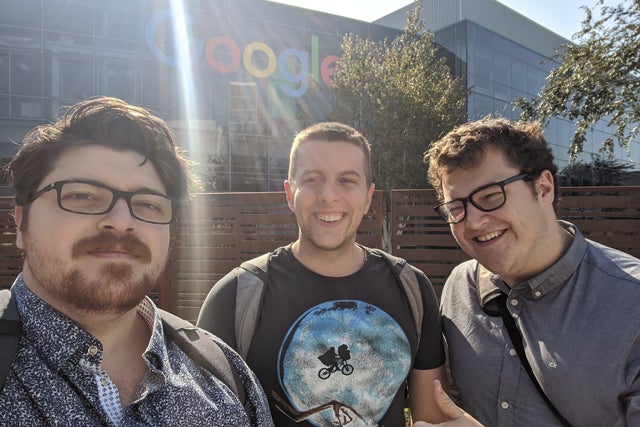Five University of Waterloo students have teamed up with Google to develop software to accelerate machine learning using quantum science.
The collaborative effort resulted in the creation of an open-source hybrid quantum-classical machine learning software platform, called TensorFlow Quantum.
TensorFlow Quantum integrates Google’s Cirq and TensorFlow and will allow for the rapid prototyping, training, inference, and testing of hybrid quantum-classical machine learning models to learn representations of classical or quantum data.
Hybrid quantum-classical machine learning is a field of research that aims to combine the power of quantum computing with that of Artificial Intelligence (AI).
TensorFlow Quantum will greatly facilitate the discovery of new ways to combine classical machine learning capabilities from TensorFlow with new capabilities emerging from the advent of early quantum computers, such as Google’s Sycamore chip which recently achieved the quantum supremacy benchmark.
“Machine learning has shown promise at learning models of nature, such as image processing for cancer detection, earthquake aftershock detection, predicting extreme weather patterns and detecting new exoplanets,” said Masoud Mohseni, Google AI Quantum’s technology lead for TensorFlow Quantum. “But today’s machine learning algorithms are built and trained using classical data while nature is inherently quantum, so to model nature at a deeper level, we need to extend the ability for machine learning to learn from quantum data, and that’s what this library will enable.
“The big benefits are that it makes hybrid quantum-classical models easy to train, by providing several tools for common subroutines used in quantum machine learning, while also coming with a high-performance simulator of quantum computations pre-packaged.”
Guillaume Verdon, a member of Professor Achim Kempf’s Physics of Information Lab in Waterloo’s Department of Applied Mathematics and computer science alumnus Michael Broughton, initially founded the project as a tool for their research in quantum machine learning. As a result, Kempf and his lab have been awarded consecutive Google Faculty Research Awards to support the exploration of quantum machine learning, a rare feat given the competitiveness of these awards.

Waterloo researchers (L-R): Verdon, Broughton and McCourt in front of Google HQ.
Google and Waterloo have a strong working relationship, which saw the technology giant approach Verdon and Broughton to build an initial prototype. In keeping with Waterloo’s emphasis on experiential learning, the students interned at Google to continue working on the project, and now both work full-time at Google. As a member of Waterloo’s Institute of Quantum Computing (IQC), Verdon recruited two other IQC members to join, Evan Peters, a Master’s student from Waterloo’s Department of Applied Mathematics and Antonio Martinez, a PhD candidate in Waterloo’s Department of Physics and Astronomy. They also welcomed Trevor McCourt, an undergraduate in Waterloo’s Department of Mechanical and Mechatronics Engineering. Together, they helped take the project from a simple prototype to a full-fledged machine learning library and took turns doing their co-op terms at Google to refine the project further.
“This project came about through an unexpected friendship which ended up sparking academic and industrial collaboration,” said Verdon, a PhD candidate in Waterloo’s Faculty of Mathematics. “This is the sort of thing that can happen at Waterloo, given that there are so many smart people with complementary skillsets and the emphasis of our local ecosystem on interdisciplinary research, which is key for the development of quantum technologies.”
“With this project, we aim to expand the capabilities of AI by hybridizing quantum computing capabilities with the most advanced software system for machine learning currently out there — Google’s TensorFlow — and thereby extend the reach of classical AI into the quantum realm.”
The launch of TensorFlow Quantum will be discussed at the 2020 TensorFlow Developer Summit, which will be live-streamed on March 11th.
A technical white paper was also released yesterday, detailing TensorFlow Quantum. The paper was co-authored by Waterloo students Verdon, McCourt, Martinez, Broughton, and Peters.
The Google team that worked on the project and paper includes Mohseni, Jae Hyeon Yoo, Sergei Isakov, Phillip Massey, Murphy Yuezhen Niu, Ramin Halavati, Jarrod McClean, Sergio Boixo, Dave Bacon, Alan Ho and Hartmut Neven. The Volkswagen Group was also involved in the development of TensorFlow Quantum through team members Florian Neukart, Martin Leib, Andrea Skolik, Michael Streif and David Von Dollen.
MEDIA
CONTACT
| Matthew
Grant
226-929-7627
| @uwaterloonews | uwaterloo.ca/news
Attention broadcasters: Waterloo has facilities to provide broadcast quality audio and video feeds with a double-ender studio. Please contact us for more information.